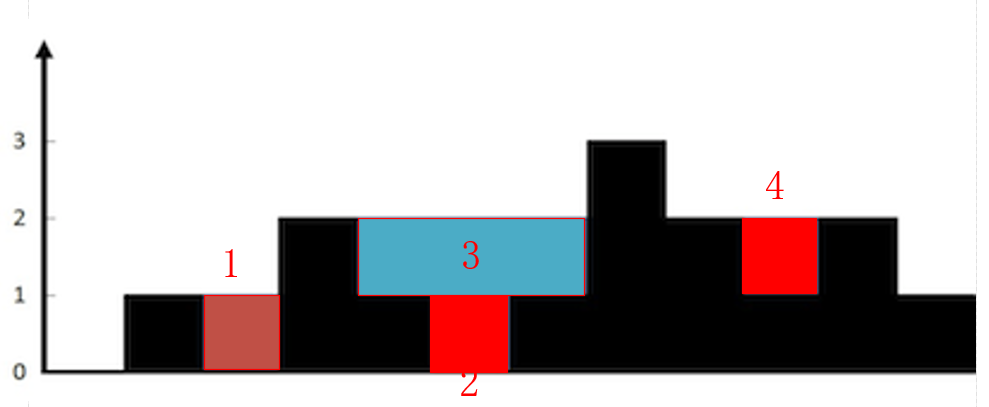leetcode#42 Trapping rain water的五种解法详解
leetcode#42 Trapping rain water
这道题十分有意思,可以用很多方法做出来,每种方法的思想都值得让人细细体会。
42. Trapping Rain Water
Given n non-negative integers representing an elevation map where the width of each bar is 1, compute how much water it is able to trap after raining.
For example,
Given [0,1,0,2,1,0,1,3,2,1,2,1], return 6.

Solution 1:
通过分别计算每一坐标i上有多少水,进而将其相加得到答案。
问题是我们如何知道每一坐标i上有多少水呢?仔细思考,其实只有出现“两高夹一矮”才可能会存到水,如下图所示。

进而,我们可以想到:每一坐标i上存多少水是由 1.其自身高度 2.它左边的最高高度left_most 3.它右边的最高高度right_most三种因素决定的。
当 min{ left_most, right_most} 小于或等于其自身高度时,它能存的水就是0,比如array[1]=1,其left_most= array[0]=0, 其right_most=array[7]=3, min{left_most, right_most}=left_most=0< height= array[1]=1,这也就是说坐标1 存不了水。
当min{ left_most,right_most} 大于其自身高度时,这时这三者间出现了“两高夹一矮”的情况,故其能存水,而且其存水数= min{left_most,right_most} - height。
我们分别来对一些坐标进行验证:
坐标1,存水数=0.//正确
坐标2,leff_most=1,right_most=3,存水数=left_most-height=1-0=1.//正确
坐标3,left_most=1,right_most=3,min{left_most,right_most}=1=height,存水数=0.//正确
读者可以对每个坐标进行验证,会发现以上结论皆是正确的。所以,现在我们的solution就出来了,我们只需要求出每个坐标对应的left_most和right_most,再把存水数相加,就是总的存水数了。
所以,很朴素自然的一个想法就是,遍历一遍数组,对每个数组元素遍历左边一次求出left_most,遍历右边一次求出right_most。
代码如下,
//29ms 6.36%
//complexity: O(N^2)
int trap(vector<int>& height)
{
int ans = 0;
int size = height.size();
for (int i = 1; i < size - 1; i++) {
int max_left = 0, max_right = 0;
for (int j = i; j >= 0; j--) { //Search the left part for max bar size
max_left = max(max_left, height[j]);
}
for (int j = i; j < size; j++) { //Search the right part for max bar size
max_right = max(max_right, height[j]);
}
ans += min(max_left, max_right) - height[i];
}
return ans;
}
Solution 2:
在solution 1里,我们已经知道只要求出left_most和right_most,就可以求出答案,那能不能优化一下求这两个数的过程呢?当然是可以的,我们只需要左遍历一次数组,右遍历一次数组,即可得到left_most和right_most。
/*Solution2: 上一种方法其实有优化的空间
通过两次for循环可分别求得left_most和right_most,第三次for循环即可求得sum,
complexity: O(n)
*/
int trap(vector<int>& height)
{
if(height == null)
return ;
int ans = ;
int size = height.size();
vector<int> left_max(size), right_max(size);
left_max[] = height[];
for (int i = ; i < size; i++) {
left_max[i] = max(height[i], left_max[i - ]);
}
right_max[size - ] = height[size - ];
for (int i = size - ; i >= ; i--) {
right_max[i] = max(height[i], right_max[i + ]);
}
for (int i = ; i < size - ; i++) {
ans += min(left_max[i], right_max[i]) - height[i];
}
return ans;
}
Solution 3:
这里再介绍一种优化方法,双指针法,在数组首尾分别创建一个指针,两指针相见时结束循环。
int trap(vector<int>& height)
{
int left = , right = height.size() - ;
int ans = ;
int left_max = , right_max = ;
while (left < right) {
if (height[left] < height[right]) {
height[left] >= left_max ? (left_max = height[left]) : ans += (left_max - height[left]);
++left;
}
else {
height[right] >= right_max ? (right_max = height[right]) : ans += (right_max - height[right]);
--right;
}
}
return ans;
}
Solution 4:
既然可以纵向的求存水数,那我们能不能一层一层的求存水数呢?

这是第一层,当我们遇到一个空的,且不在边界,存水数+1,所以第一层我们在i=2,i=5 时分别+1.

第二层,存水数+4,依次类推,最终可以求出答案。
代码笔者就不给了,读者有兴趣的可以自己写来试试。
Soluton 5:
这是在leetcode中solution给出的一种很新颖的解法,利用了栈的结构,通过维护一个非递增栈来得到答案。
本质思想还是利用了要存水必须是“两高夹一矮”这个特点,只不过这里是用非递增栈来实现。

下面定义一些符号以便理解:
stack[-1] 栈顶元素
stack[-2] 栈顶的下面一个元素(即倒数第二个元素)
solution4的整个算法是这么实现的:遍历数组,遇到一个元素时,将其与栈顶元素比较,如果其小于等于栈顶元素,直接压栈,将其放入栈中(为维护非递增栈的结构,不能将比栈顶元素大的元素压栈),
若是其大于栈顶元素,此时一定形成了一个“两高夹一矮”局面,因为栈是非递增栈,所以 stack[-1]<stack[-2],又 current>stack[-1],所以是一个“两高夹一矮”局面,此时算完存水数后栈顶元素出栈,继续判断,
递归处理即可。
在上例中整个过程是这样的。
step0: 0不入栈
step1: 1>0 array[1] 入栈 栈:[1]
step2: 0<stack[-1]=1 入栈 栈:[1,0]
step3: 2>stack[-1]=0 存水数+1,0出栈,2>stack[-1]=1, 此时stack内元素不足2,不足以形成“两高夹一矮”局面, 1出栈,2入栈 栈:[2]
step4: 1<stack[-1]=2 1入栈 栈:[2,1]
step5: 0<stack[-1]=1 0入栈 栈:[2,1,0]
step6: 1>stack[-1]=0 存水数+1,0出栈 1=stack[-1] 1入栈 栈:[2,1,1]
step7: 3>stack[-1]=1 存水数+0,1出栈 3>stack[-1]=1 存水数+3,1出栈 3>stack[-1]=2 存水数+0 2出栈 3入栈 栈:[3]
step8: 2<stack[-1] 2入栈 栈:[3,2]
step9: 1<stack[-1] 1入栈 栈:[3,2,1]
step10: 2>stack[-1] 存水数+1 1出栈 2入栈 栈:[3,2,2]
step 11:1<stack[-1] 入栈 栈:[3,2,2,1]
done
/*Solution4
Stack solution
这个solution利用了栈结构,通过维护一个非递增栈,一步一步算出ans
*/ int trap(vector<int>& height)
{
int ans = , current = ;
stack<int> st;
while (current < height.size()) {
while (!st.empty() && height[current] > height[st.top()]) {
int top = st.top();
st.pop();
if (st.empty())
break;
int distance = current - st.top() - ;
int bounded_height = min(height[current], height[st.top()]) - height[top];
ans += distance * bounded_height;
}
st.push(current++);
}
return ans;
}
leetcode#42 Trapping rain water的五种解法详解的更多相关文章
- LeetCode 42. Trapping Rain Water 【两种解法】(python排序遍历,C++ STL map存索引,时间复杂度O(nlogn))
LeetCode 42. Trapping Rain Water Python解法 解题思路: 本思路需找到最高点左右遍历,时间复杂度O(nlogn),以下为向左遍历的过程. 将每一个点的高度和索引存 ...
- [array] leetcode - 42. Trapping Rain Water - Hard
leetcode - 42. Trapping Rain Water - Hard descrition Given n non-negative integers representing an e ...
- LeetCode - 42. Trapping Rain Water
42. Trapping Rain Water Problem's Link ------------------------------------------------------------- ...
- [LeetCode] 42. Trapping Rain Water 收集雨水
Given n non-negative integers representing an elevation map where the width of each bar is 1, comput ...
- leetCode 42.Trapping Rain Water(凹槽的雨水) 解题思路和方法
Trapping Rain Water Given n non-negative integers representing an elevation map where the width of e ...
- [LeetCode] 42. Trapping Rain Water 解题思路
Given n non-negative integers representing an elevation map where the width of each bar is 1, comput ...
- [leetcode]42. Trapping Rain Water雨水积水问题
Given n non-negative integers representing an elevation map where the width of each bar is 1, comput ...
- LeetCode 42 Trapping Rain Water(积水体积)
题目链接: https://leetcode.com/problems/trapping-rain-water/?tab=Description Problem: 根据所给数组的值,按照上图的示意 ...
- Java [Leetcode 42]Trapping Rain Water
题目描述: Given n non-negative integers representing an elevation map where the width of each bar is 1, ...
随机推荐
- 【持续更新】.Net 开发中给自己埋下的坑!
1.文件“XXX”正在由另一进程使用,因此该进程无法访问此文件. 原因剖析:文件在主线程操作,在子线程中读写操作文件,刚开始没有意识到程序的问题所在,总是在FileStream中报错,google后常 ...
- (转)MySQL存储过程/存储过程与自定义函数的区别
转自:http://www.cnblogs.com/caoruiy/p/4486249.html 语法: 创建存储过程: CREATE [definer = {user|current_user}] ...
- PHP异常处理机制
1. 异常: 异常(Exception)用于在指定的错误发生时改变脚本的正常流程. 当异常被触发时,通常会发生: (1)当前代码状态被保存: (2)代码执行被切换到预定义的异常处理器函数: (3)根据 ...
- LeetCode 26. Remove Duplicates from Sorted Array (从有序序列里移除重复项)
Given a sorted array, remove the duplicates in place such that each element appear only once and ret ...
- CentOs 系统启动流程相关
CentOS的启动流程 1)加载BIOS 的硬件信息,获取第一个启动设备 2)读取第一个启动设备MBR 的引导加载程序(grub) 的启动信息 3)加载核心操作系统的核心信息,核心开始解压缩,并尝试驱 ...
- Asp.net MVC4高级编程学习笔记-模型学习第五课MVC表单和HTML辅助方法20171101
MVC表单和HTML辅助方法 一.表单的使用. 表单中的action与method特性.Action表示表单要提交往那里,因此这里就有一个URL.这个URL可以是相对或绝对地址.表单默认的method ...
- 【hihoCoder】#1039 : 字符消除 by C solution
#1039 : 字符消除 时间限制:1000ms 单点时限:1000ms 内存限制:256MB 描述 小Hi最近在玩一个字符消除游戏.给定一个只包含大写字母"ABC"的字符串s,消 ...
- C++中的endl
从开始接触C++到现在,一直以为语句 cout << "hello world!" << endl; 中的endl只是一个相当于C中的换行'\n':直到今天 ...
- 【JavaEE】企业面试问题-Java基础
1. Java基础部分 1.1 Java中的方法覆盖(Overwrite)和方法重载(Overloading)是什么意思? 重载Overload表示同一个类中可以有多个名称相同的方法,但这些方法的 ...
- Ignatius and the Princess IV(乱搞一发竟然过了)
B - Ignatius and the Princess IV Time Limit:1000MS Memory Limit:32767KB 64bit IO Format:%I64 ...
